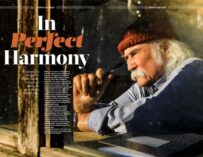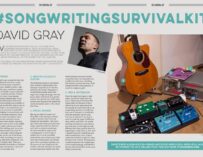
David Gray
The White Ladder man explains his new approach to songwriting, taking inspiration from poetry, boredom and a child’s toy harp
![]() uring the late 90s and early 00s, there was one man who personified the British singer-songwriter: David Gray. The earnest self-propelled musician from Sale had released three overlooked albums by the time White Ladder arrived in 1997 to widespread commercial and critical acclaim. What appeared to be an effortless blend of acoustic instruments and electronic samples put David on the map, but it hadn’t been easy.
uring the late 90s and early 00s, there was one man who personified the British singer-songwriter: David Gray. The earnest self-propelled musician from Sale had released three overlooked albums by the time White Ladder arrived in 1997 to widespread commercial and critical acclaim. What appeared to be an effortless blend of acoustic instruments and electronic samples put David on the map, but it hadn’t been easy.
Having been previously signed and dropped twice – first by Hut Records and then EMI – David decided to self-finance the fourth album and release it on his own label, IHT Records. Recorded in a flat in London, White Ladder went on to enjoy multi-platinum sales and Babylon peaked at No 5 on the UK Singles Chart. It even made waves in the US, with the album earning David a nomination at the 44th Grammy Awards for Best New Artist.
Four years later, he followed the international breakthrough with the album A New Day at Midnight and then worked with producer Marius de Vries (Björk, Rufus Wainwright) for 2005’s Life In Slow Motion, which debuted at the top of the album charts in the UK and Ireland, giving Gray the highest chart rankings of his career.
David found himself without a record label again as he started work on his eighth studio album, Draw The Line. However, it was ultimately released by Polydor in 2009, with lead single Fugitive becoming a Top 40 hit in the US, and the album charted well on both sides of the Atlantic. He returned soon after with Foundling, consisting of material from the previous album sessions and arrived less than a year after the Draw The Line‘s release.
We find David brimming with excitement, about to embark on a UK tour in support of his 10th studio album Mutineers and thriving on a fresh approach to songwriting (and working as hard as ever)…
How do you start when you approach writing a song? Is it a daily work ethic for you or do you wait for the urge, for the muse to arrive?
“At the moment I’m busy promoting my record, so I’ve turned that switch down. There’s no real option to think those lovely thoughts about what I can write next. I have always got ideas going – I’m always taking notes. Basically, taking snapshots of ideas for melodies on my phone. I find that rehearsals and the casual moment when you’ve been playing hard and concentrating on something else, what your hands and mind alight on then is often an interesting thing. When you’re not thinking. I find those moments often lead to something.”
Can you think of a particular moment which lead to a song like that?
“There’s a song on the new record called Last Summer. I went down to this little music shop in Camden and noticed this little toy harp and gave that a try. I found it was tuned to ‘G’ so I made this chord sequence, recorded it, put a piano part over it, a melody then came and I found a lyric straight away, and this song was born. So I find new instruments and new tunings on the guitar are often a good place to start.”
[cc_blockquote_right] I STARTED LOOKING AT LYRICS I’D WRITTEN DOWN AND TRIED TO FIND A TUNE – WORK IT BACKWARDS [/cc_blockquote_right]
Do you normally start with the chords first, like that?
“In the past, nine times out of ten, I’d always start with chords, then melody and then find the lyrics to fit the piece. But I think I came to the end of a cycle with my last two records, Draw The Line and Foundling, and I knew I wanted something different this time round. Quite how I was going to go about it, I didn’t know, but instead of carrying up the creative mountain it meant trying all kinds of new ways and means to start writing a song. I was bored of the things I was saying and I was bored basically of myself. I wanted something, but I didn’t know what it was, so I started looking at lyrics I’d written down and tried to find a tune – work it backwards.
“The weird thing about that was I didn’t really have an opinion – my tastes didn’t kick in. So I didn’t weigh in with any editorial decisions, apart from just using my writing instincts, as to where I wanted things to go next. I didn’t know whether what I was doing was good, I wasn’t glorying in the emotion of the whole thing, I was just being objective. Anyway, it yielded some really interesting results.”

David Gray
What did you do when you ran out of lyrics?
“Well, then I started working back from other people’s words. I found a poem that I really liked called Just As This Island Belongs To The Gold. The first verse is incredibly simple, but I thought that could be a song – I just heard some music in it. So I went down to the piano and put some chords down and started to write from there. I’d tapped into a new sphere where I’m working in abstractions and it had my full attention. All the feeling was there, but I didn’t really know what I was doing. So I guess I lurched towards ‘not knowing’ – that was one of my default processes this time round, because I needed to do something different, so I started trying to work in ways that weren’t comfortable, or known, to me.”
Were your lyrics more or less autobiographical in this album?
“No, I think lyric writing is an act of imagination. Jesus, you’d have to have a bloody eventful life if you’re going to write a song like that every day of the week! The feeling has to come from somewhere, and there’s probably enough emotional content in a week to last you the rest of your lifetime, if you want to delve into it. Sometimes afterwards I’ll realise where the feeling that underpinned the whole thing, the floor of that song, was coming from, and obviously the best ones really do come from your heart. There’s something you’ve really deeply felt and hung onto that was dying to take form as a song.
So do you consciously avoid writing from personal experience?
“Occasionally that might come into it, but I’ll apply an editorial hand to it. I don’t want to write an autobiography – I write along the rules of the cadence of each word, the rhyming scheme and the rhythm of the tune – I will bend to that, not to my own feelings about what really happened. So it’s the rules of songwriting and the music of words that have a ring of truth to them sometimes. That’s what you’re looking for. There’s a mathematics to music, it’s science really – how creates the sense of emotion in people is quite remarkable. It’s loaded into music already.

David Gray
“The more I go on, I realise I can be objective too, I don’t have to be a subjective being. The objectivity often leads to the strongest things happening, particularly now I’m so far down the road, I’ve written so many songs, I’ve got to end of different cycles of doing it a certain way, and I have to find a new way to keep myself interested. I’m thirsty for new ideas and to get beyond literal meaning – that’s where I want to be. I want to be in the realm of the purely poetic, but sometimes you have to write a song to get there.”
[cc_blockquote_right] I’M GENERALLY AT MY BEST FIRST THING IN THE MORNING, FOR POETIC FLIGHTS OF FANCY [/cc_blockquote_right]
How do you manage to keep things fresh, when you’ve been songwriting for such a long time?
“Rather than sit at my piano or with guitar in hand, and over-analyse and wonder where the song’s going, or if it’s really something new, I think the best thing to do is write it and worry about that later. One of the most important things about songwriting is creating a sense of momentum – even if it’s an inconsequential thing, write it and worry about it later. Do it! That’s how I’ll get into the rhythm of writing – I’ll have all these songs going round my head simultaneously. I’ll be working on one and then suddenly have an idea for something else. It’s like dragging a canvas out, sticking it up on the easel, making a couple of brush strokes and then it’s finished. So they sort of pile up by my side, and then I lean over and work on the one that I wasn’t working on.
What does your typical working day consist of?
“I’m quite dutiful once I’m in writing mode. I’ll go down when I drop the kids off, then I’ll work for four or five hours, with a bit of a lunch break. That’s plenty. Sometimes longer, sometimes later, but I’m generally at my best first thing in the morning, for poetic flights of fancy. Before my brain’s had a parking ticket given to it, or I’ve tried to get through the London traffic, and I’m seething with hatred and misanthropy! I think it’s best to get the work done before that happens.”
Interview: Aaron Slater
An extended version of this interview will feature in the first digital edition of Songwriting Magazine, due to launch later this year – check back here for more details very soon! In the meantime, David Gray’s new album Mutineers is out now and you can find tour dates at his official website: www.davidgray.com. Below is the video for Beautiful Agony, his latest single.



































Related Articles